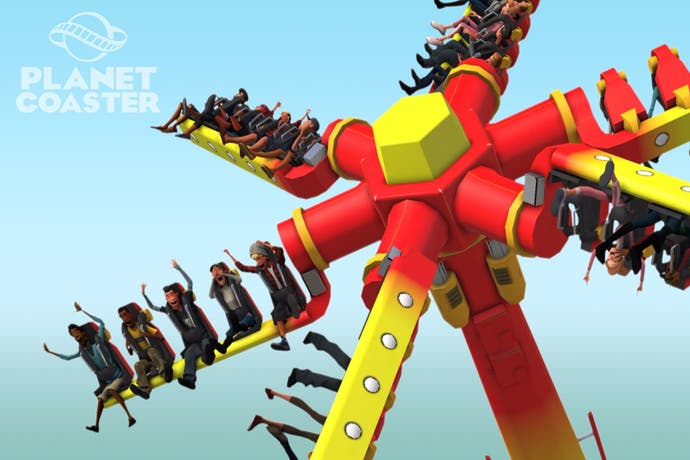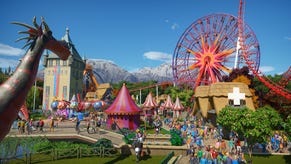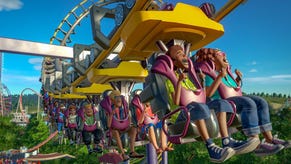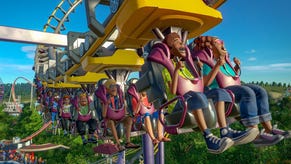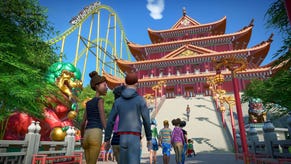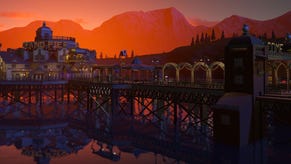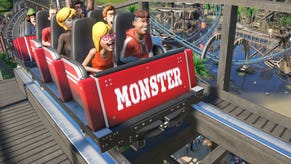The people power of Planet Coaster
The wisdom of crowds.
There's a certain tension at the heart of every good theme park. As a park owner, you naturally want your punters to have a good time. But as a currency, smiles and laughter only go so far. At some stage, you're going to need them to open their wallets. "It's like a John Lewis advert, right?" says John Laws, art director at Frontier Developments. "I get the exact same feeling when I see the John Lewis advert at the end of each year: 'Oh, that's really nice production design, better than most other ads'. And ultimately they just want me to spend money. But I don't care, because it's nice to watch."
Planet Coaster has been under construction for about a year at Frontier, and it's already nice to watch. It's become a cliché for developers to say they're building a game from the ground up, but in this case it's entirely accurate. Though its foundations are not set in stone; rather, they're in constant motion - when they're not queuing, at any rate.
"The people are the beginning of the story, the first piece of the puzzle," says lead technical artist, Sam Denney. "When you open your park, these are the first things that start to move. They're the brains and the lifeblood of the park. They drive everything - you pour them in and off they go."
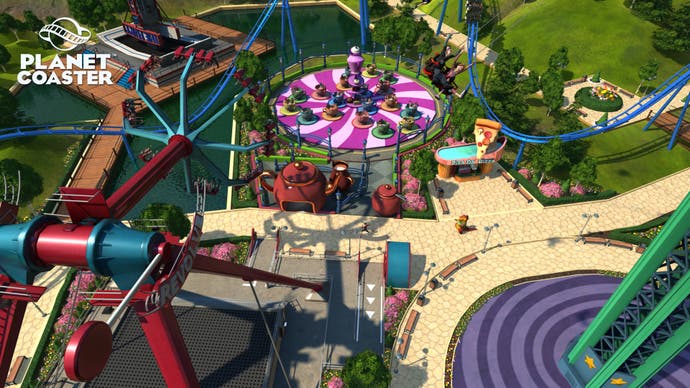
This explains why Frontier has opted to focus the game's first developer diary on the technical challenge of creating realistic crowds. The studio's proprietary engine has matured to the stage where it's capable of rendering hundreds of individual characters, each of whom will behave like a human being. They will avoid collisions rather than passing through one another as in many previous sims, naturally forming groups when it makes sense to do so.
The goal, says Laws, is to make each punter more believable than any previous coaster game, which Frontier believes is important for a variety of reasons. "Sam's team is working on the rides, and they're beautiful. It might sound like bullshit, but they really are lovely, each one feels solid, like a really heavy metal object. But it's when you put the people on there that they suddenly come to life."
He hopes, too, that the effort invested in individualising each visitor will encourage players to care for their well-being, and to fulfil their needs. Whether you're following a family group looking for the kid-friendly attractions, or a thrill-seeking teenager searching for the most intense rides, you'll feel a greater sense of urgency in designing the arteries of the park to guide them there. "They're not just little butterfly particles that are avoiding stuff. They do actually care about what's going on and they do react to what you're doing."
It's also about readability - being able to instantly spot a problem without the need to wait for a series of sad-face emoticons telling you what's wrong. "You can [gauge] their behaviours and their emotions," Denney chips in, "whether they're hungry, excited, tired or scared. It's that human element you connect with when you look at the park."
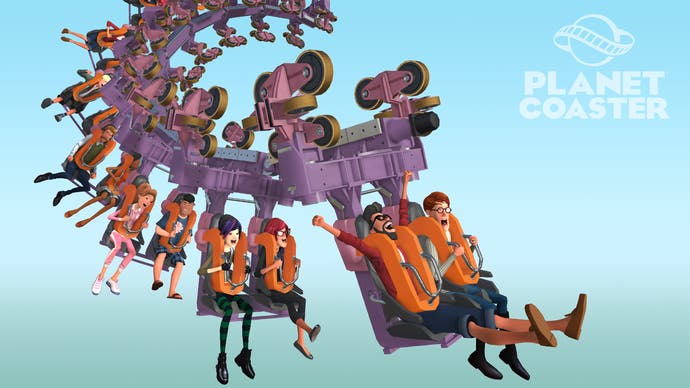
If all this is an incentive to shift the camera to ground level more often, Frontier is well aware that most players are likely to spend the vast majority of their time viewing their park from a much higher perspective. "You could say [it's] incredibly wasteful to show these low shots of how the crowd simulation works and watching that granularity when 80% of the game can be spent looking down from above. And yeah, we totally get that - you're going to be building scenery, coasters and amusement rides and you can only really do that from a position where everyone is a tiny little grain on the screen. But because you're aware that each person is an individual that's being tracked, and you get this mental image of who they are and how they emote, when you're placing things down and you see that wave of reaction that makes it more fun for you as a player."
There is, adds Denney, a simple voyeuristic appeal to people watching that should, in theory, immerse the player more deeply in the simulation. "We've built our assets to a high level of detail, so when you [zoom in] you can see that we could push into a first-person mode and it would be quite acceptable. It's the reason why I like skeleton watches, because I can see that almost infinite detail - I can get in close and look at all the little mechanisms and appreciate the craftsmanship. I think people really enjoy that level of fidelity and detail."
If there's a concern, it's that this apparent focus on the physical simulation could potentially come at the cost of the depth and scope of the game itself. After all, Maxis' 2013 reboot of SimCity drew as much criticism for its mechanical limitations as its litany of technical problems. Though Frontier says it has absorbed lessons and ideas from the likes of Thrillville and last year's Screamride, it's acutely aware that it has a balance to strike between accessibility and complexity. Indeed, the spirit of Planet Coaster hews much closer to the evergreen Rollercoaster Tycoon 3 - and may, in fact, go one step further in terms of systemic depth.
"Well, we're certainly not planning on dumbing down the design," says Laws. "Quite the opposite," adds Denney, who reveals that many of the original team on Rollercoaster Tycoon 3 are working on Planet Coaster, from designers to artists and coders. If one of the studio's biggest successes (the iOS version continues to sell well) is a strong influence, that isn't to say that the current team accepts that it already has a solid structure for the management elements. "Trying to emulate what's been done previously is no good," says Denney. "What we're trying to do is rebuild from the basic concept of building a park that suits a simulation. Our systems are far more complex than they were in RCT3, because a lot of that stuff wouldn't really fit into the traditional framework. We've reimagined the whole thing."
Planet Coaster is being developed primarily for PC, though discussions about other platforms are ongoing. The pair bristle slightly when I observe that its stylised aesthetic could be described as 'console friendly'. "It's far from a console-friendly game," laughs Denney. "I always hate the way the word 'cartoon' is used as a perverse insult half the time," adds Laws, and that 'console friendly' [tends to] mean simplistic. If anybody told me that Mario was a kids' game... my child cries playing Mario. It's a tough game! I mean, Planet Coaster looks immediate, it's got a friendly face. But I don't see that as a problem. Like, when we made LostWinds, we had hard-arse core gamers thanking us. It showed you can present something which is accessible but on a gameplay level is really deep and very detailed. It doesn't follow that it shouldn't be sophisticated."
It's clear Frontier is keen to be open and candid as Planet Coaster develops, and we should expect to see more on the management side in upcoming video diaries. But the sense of excitement at the studio is already tangible. Like a good park owner, Frontier naturally wants us to spend money on Planet Coaster. But it's especially keen to ensure its punters are having a great time.
